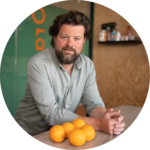Pioneers in upcycling orange peels
PeelPioneers is an innovative company which upcycles orange peels from waste into valuable ingredients for the food industry. The company is also known as ‘the peel farmer of the 21st century’. Founded in 2017, they operate a factory in Den Bosch. Recently, they joined IFFI. “Joining IFFI provides a fantastic opportunity to engage with industry colleagues and learn more about other, more established ingredients companies,” says CEO Bas van Wieringen.
It may seem surprising, as PeelPioneers have been transforming orange peels for a while now. However, Van Wieringen’s background isn’t in the food industry. “I worked with waste streams, focusing on circularity. In waste management, orange peels are problematic due to their acidity and moisture, making them difficult to incinerate or produce biogas.” He met Sytze van Stempvoort, who also saw the potential value in peels, and together they decided to explore the possibilities. “Consumers mainly use the juice of oranges, discarding the rest, which is half the weight and this is (literally) a waste!”
The first obvious use was extracting oils from the peels for fragrances and flavourings. “We spent significant time perfecting our technique in the lab. Eventually, we had to enter the market and prove ourselves. This paid off when food companies approached us for collaboration.”
Later, they found a way of extracting another ingredient from the peel: orange fibres. These fibers are neutral in smell and taste, suitable for various applications such as meat substitutes, soups, sauces, bakery products, and confectionary. “These fibers are functional and have particularly emulsifying properties.”
PeelPioneers this year was ranked number 30 of the global Foodtech 500. The company operates a factory in Den Bosch and employs around fifty people. “Logistically, we are well-positioned at the intersection of two major highways, facilitating efficient transport from north to south and east to west.” Logistics are crucial because the peels must be processed within 72 hours of pressing to maintain quality. Additionally, the location offers access to a skilled workforce. “Several colleges, including HAS with its food program, are nearby, helping us attract young talent.”
For Van Wieringen and his partner, managing operations has been a learning curve. “We had to learn how to manage people, ensure the right team dynamics, and build reliability. Initially, some suppliers were sceptical as they produce peels daily and couldn’t afford waste buildup.” Over time, PeelPioneers established themselves as dependable partners, collecting peels from supermarket distribution centers and the hospitality industry. “Looking ahead, maintaining a sufficient supply of peels in the Netherlands is a concern. Therefore, we are considering opening a factory in Spain to stay close to our source.”
One challenge the company faces is ensuring a sufficient supply of peels. Another is reaching out to food companies and marketing the fibers as an ingredient. “I must admit, I underestimated this. Selling oils as fragrances and flavourings was straightforward. Selling a functional ingredient is a different story. It involves educating customers about applications without taking their place, and navigating more regulations and restrictions. The processes also take much longer. Increasing our fiber sales is a significant challenge for the coming years. We aim to remain a leader in the field, which requires continuous innovation and talent retention.”
PeelPioneers deliberately chose to join IFFI. “We looked around to find the best fit. Networking events are common, but they need to be valuable. Typically we act in networks with other tech scale ups, not so much with the food industry. At IFFI, we sit directly with the right people, not just commercially but as colleagues with similar experiences and challenges. The exchange of knowledge and experience is valuable for me and other disciplines within the company.”

Bas van Wieringen
CEO PeelPioneers
